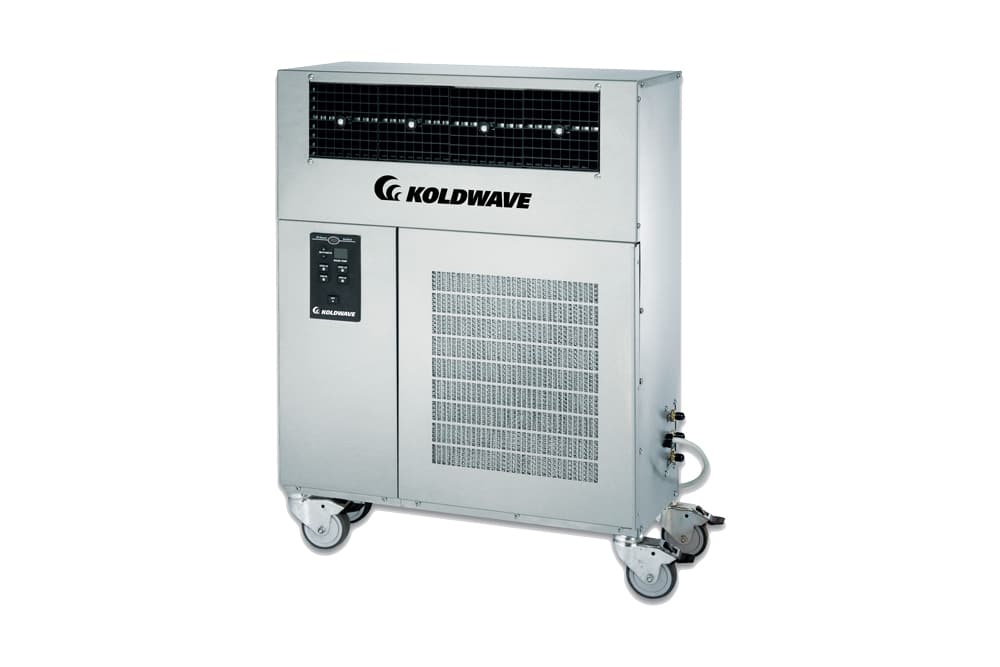
If you're in need of portable air conditioning, whether indoor or outdoor, you have a number of options available to you. One of the common types you'll find is the water-cooled air conditioner. What exactly is this, how does it differ from other AC types, and when should it be used?
At 1 Source Portable Air, water-cooled units encompass just a portion of our extensive selection of portable air conditioner rentals, which also includes spot coolers, evaporative coolers, and more. What is a water-cooled air conditioner, how does it differ from an air-cooled option, and what are some of the factors to consider when determining if this is the right option for your needs? Here's a full rundown.
In many ways, water-cooled air conditioners are similar to air-cooled options. They both use condensers, evaporators, compressors and expansion valves, and both require refrigerant to operate. The primary difference is in the cooling process, which is where the term “water-cooled” comes into play.
In air-cooled units, the heat from the surrounding air is pulled into the air conditioner and absorbed into the refrigerant which cools the air as it passes over the coil. The cool air is then recirculated into the space, while the warm air is ducted outside. In water-cooled units, warm air is again pulled into the air conditioner, but the heat is dissipated by water. Water-cooled air conditioners do not use ducting but rely on their connection to a water supply to continually cool the warm air that’s being pulled in. Water-cooled units also require a place to drain condensate.
Some people hear the term "water-cooled" and assume it means the same thing as evaporative coolers; this is a common misconception. Evaporative coolers are a type of cooling solution that use water to cool air as it passes through a wet pad or medium; they are most effective in very hot, dry climates. On the other hand, water-cooled units use water to remove heat from refrigerant, and are ideal for situations where an evaporative cooling system is not practical.
What should you consider when comparing water-cooled options to other cooling solutions? Our next several sections go over some of the key areas.
One of the primary benefits of water-cooled AC systems is their ability to operate without ducting. If the space you're trying to cool has limited or no venting or ducting, then a water-cooled unit may be your best option.
As referenced earlier,water-cooled units do not require ducting to discharge the hot air, instead relying on a hose or existing piping to supply the unit with water, and then continuous circulation of the water to cool the air. This makes water-cooled air conditioners ideal for hotels, schools, warehouses and other large buildings with access to an available water line but no venting or ducting.
In addition, water-cooled air conditioners are fantastic options for spaces that do not have drop ceilings or any other way of exhausting hot air out of an enclosed area. This is because they don't require any ducting or other means of moving the heated air out, relying solely on water to do this job.
As a result, they can be used in areas where it may not be feasible to use an air-cooled system before – such as warehouses with high ceilings or large commercial buildings. They're also common in retail stores and restaurants, where the sound of a fan could be too loud and distracting.
Water-cooled AC units tend to be more energy efficient than their air-cooled counterparts. They don’t need to run as often to keep indoor areas cool, resulting in less energy utilization than air cooled air conditioners. They also recycle the vast majority of the water they use and cool air more efficiently which can help lower the overall energy costs of running your air conditioning system.
The recommended operating range for water-cooled AC units is wide, ranging between 65 and 105 degrees Fahrenheit. These units are also more effective than air cooled units in areas with high ambient temperatures. The process by which heat is transferred within water cooled air conditioners is more efficient than the process by which refrigerant cools the air in air cooled units.
Many water-cooled AC units are also designed to be portable, meaning they can easily be moved from one room or space to another. This provides flexibility when cooling multiple areas of a building or venue.
One area you do need to be mindful of when considering a water-cooled AC system is the amount of water needed to operate it. Generally, these systems require more water than other types of air conditioners, so you need to make sure that you have access to an adequate, consistent supply.
Water usage also affects how much energy your unit needs – if there isn't enough water circulating through it, then it won't be able to cool the space as efficiently. That's why it's important to make sure you have taken into account your unit's water needs before installation.
Overall, water-cooled AC units are a great option for any setting where ducting is not practical or possible. They're energy efficient and can handle a wide range of temperatures, making them ideal for almost any situation. If you need cooling in an enclosed space where air-cooled units aren't an option, then a water-cooled AC system may be the perfect choice.
For more here, or to learn about any of our portable HVAC unit equipment and services, speak to our team at 1 Source Portable Air today.